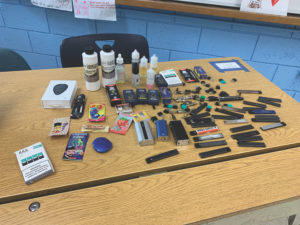
products he has confiscated from students over the past year. (Photo Sean Fleming)
EASTHAM — The current e-cigarette ban and recent cases of vaping-related illness have affected the number of students using vaping products on campus at Nauset Regional High School. Assistant Principal Sean Fleming told the Independent that the number of kids getting caught vaping at school has decreased by more than half since last spring.
Gov. Charlie Baker announced a four-month ban on all vaping product sales in Massachusetts in late September, declaring the use of electronic cigarettes a public health emergency. According to the Centers for Disease Control and Prevention, 1,888 cases of vaping-related illness have been reported in the U.S., 37 of which resulted in death. Three such deaths are now known to have occurred in Massachusetts. Most vaping products associated with these cases were bought illicitly and contained THC.
State and national events have had a greater impact on Nauset students than events on their own campus. “We had an incident last year from a kid who had an overdose of nicotine. That didn’t slow it down,” Fleming said. “But this year, with the ban and deaths across the U.S., that tapped the brakes a little bit on it.”
Some students nevertheless continue to smoke e-cigarettes on school property. Fleming thinks it’s because they’ve been told vaping-related illness has been linked only to black-market products, which is “totally inaccurate,” he said. “They continue to use [vaping products], but I have no clue where they’re getting them.”
During his five years at Nauset, Fleming said, vaping has been a continual issue. E-cigarette use peaked during the last two years, which he thinks was related to flavored e-cigarettes and advertising targeting children.
When a student is caught vaping on school grounds, discipline is geared towards education rather than punishment. After being suspended, a student must work with family, doctors, and teachers to devise a moderation plan before being allowed to return to school.
Most on-campus e-cigarette use occurs in school bathrooms, and last spring rest room doors at Nauset were propped open to dissuade vaping, leading to outcries about the violation of students’ privacy. The doors were soon closed, but some students are now seeking out single-stall bathrooms to avoid peer pressure.
Freshmen and sophomores at Nauset are also learning about the dangers of vaping during health class. Fleming said that students are given tangible examples: the e-cigarette liquid, after being vaporized, becomes an aerosol, hardening like hair spray and leaving behind an oily layer in the lungs.
Increased Cigarette Sales
Not all tobacco-selling businesses on the Cape have been affected by the e-cig ban, as demand for e-cigarettes was always low and stores sold few vaping products before the ban. But some businesses are seeing a boost in cigarette sales.
At Cumberland Farms in Provincetown cigarette sales are up. Employee Sam Mitchell believes most people who purchased vaping products had previously smoked cigarettes, tried to quit by using e-cigs, and are now returning to old-fashioned tobacco cigarettes.
“Most [customers] who bought e-cigs seemed between 25 and 50 — people who had been smoking for a while,” she said, adding that few young adults purchased vaping products before the ban went into effect.
Mitchell thinks that vaping companies targeted young people by using models who appeared under 18 in their advertising campaigns. “They’re a bit predatory in their advertising,” she said.
Cumberland Farms has returned all its vaping products to suppliers like Juul. Before, e-cigarettes occupied over half of the behind-the-counter display. Now Cumberland Farms has replaced some of the empty shelving with chewing tobacco, Mitchell said, although it’s much less popular than other tobacco products.
Mitchell said that several customers have recently attempted to buy e-cigarettes. On being informed of the ban, “They’ve taken their business elsewhere, maybe going all the way to New Hampshire,” she said.
An employee at Pamet Valley Package in Truro, who declined to give her name, also confirmed that cigarette sales have risen since the ban went into effect.
Not all businesses have been affected by the ban, though. An employee at Yardarm Liquors in Provincetown, who declined to give his name, said that cigarette sales have always been high at the store, and vaping products never caught on with their clientele. He noted that most stores that sell tobacco products on the Outer Cape sell a variety of other products, so most customers are not specifically looking to buy e-cigs.
“People come in here to buy wine, and sometimes they’d notice a vape and buy it,” he said, just like the CBD gummies or other tempting trifles displayed near the checkout counter.
According to the Tobacco Map of Massachusetts, Provincetown, Wellfleet, and Eastham have tobacco smoking rates of 13.9, 14.4, and 16.7 percent, respectively, and also have set the minimum age of purchase to 21. No data are available for smoking rates in Truro, whose minimum legal sale age is 18. Throughout Massachusetts, smoking rates are correlated with median income, with poorer areas having higher rates.
